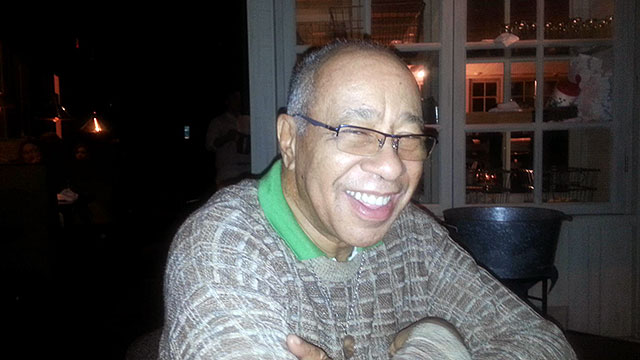
The more you get to know Alex Morisey, the more you become aware you are speaking with a spiritual giant. His path has woven through so much of our world of faith and through the lives of so many Friends that he has become part of the fabric of the Religious Society of Friends. Key to Alex’s approach to his spirituality is his intuitive connection with the world and people around him. Not inclined to regale listeners with his many noteworthy accomplishments, Alex seems happier sharing how he finds himself in the natural world that surrounds him and how valuable people of all walks of life are to him. As an avid writer, Alex loves to write essays that explore the meaning of all this, the meaning of his life and his faith. Alex is a member of the Central Philadelphia Monthly Meeting.
Q: First off, can you tell me about your spiritual journey and how Quakerism has played a role in it?
My spiritual journey began in 1955 when our family moved from Winston-Salem, NC to Philadelphia. We moved there because my father accepted a position with the American Friends Service Committee, a Quaker organization. My parents and I soon found Quakerism to be our spiritual home. It has been very important to me throughout my life.
I’m 80 now, but I have been involved in Quakerism since I was 15 or 16. I went to a Quaker college and got my Master’s in Public Administration at the University of Pennsylvania. However, I knew I didn’t want to work in public service. I used my skills to work in grassroots community relations, first in public housing, then for a corporation and a board composed of farmworkers. I also worked as a deputy and director for a lighthouse in Philadelphia, and as the executive search secretary for the Friends World Committee for Consultation.
Q: Can you elaborate on the different roles you’ve had within the Quaker faith?
The only role I was employed in that directly related to Quakerism was with the American Friends Service Committee and the Friends Neighborhood Guild. I also served on the board of trustees for my alma mater, Wilmington College, which is a Quaker school. One of the things that I am currently struggling with is feeling like my service on these boards did not have as much impact as I had hoped.
Q: Writing is a special practice for you. You’ve shared with me that you use it to connect with your spirituality and explore your life. Can you speak more to what it means to you?
When I was at Wharton, I really got into writing. That’s kind of where it got started for me. And now I spend a lot of time writing essays. I’ve written about mental health and spirituality. So my thought is, maybe there will be a series of essays that will come together into the book.
Q: You seem very driven by the ideologies you espouse, can you speak more to how that works for you?
Although I’m an introvert, people talk with me about their problems, and I’ve always welcomed that. It’s been a big part of my life actually. I enjoy speaking with people about their purpose in life. This has led to me making a lot of friends over the years, and I feel very proud of and comfortable with the fact that I have this ability to connect with others.
To some people it may seem like a burden to connect in the way I do with people, but it doesn’t feel that way to me. There’s a great American prayer. There is a Native American prayer, The Great Spirit Prayer, and I look at it quite frequently, because it teaches you how to have compassion without letting empathy overwhelm you. You have to be very clear about that and that’s how I find balance and avoid becoming overwhelmed by people that are sort of dumping their stuff on me.
I served in the VISA program of the American Friends Service Committee which is very similar to the Peace Corps. I was a volunteer for 2 years and did community development in a slum of Guatemala City. It was called Alternative Service because I am a conscientious objector.

Instead of going to military service, I went to Guatemala and worked in a very poor neighborhood in Guatemala City. It was set on a hillside, no in-house water, just outhouse and dirt floors too. It was supposed to be the second worst neighborhood and I don’t know why but I really bonded with the people there. I was in Egypt for 5 days, as one of the two people chosen as a mental health consumer to represent the US at an international mental health conference. I became friends with three Egyptians. In spite of our different spiritual traditions, we were able to bond in the short time I was there. I am still in touch with one of the friends that I made. We refer to each other as brothers.
There’s so many people that still look to me for support. I’m the only person there for them sometimes. And yes, that can be hard, but it’s also a gift.
Q: Can you tell me more about your spiritual beliefs and how they have influenced your life choices?
The spiritual component is crucial and central to who I am. For me, it means being true to my heart and fulfilling my spiritual purpose, whether that’s through helping others or learning from them. I have also learned a lot from working in less fortunate communities and neighborhoods, such as public housing and poor areas in Philadelphia and Guatemala. I see these communities not as “poor”, but as places where people live who are less fortunate and have different circumstances. It has given me a broader understanding of the world and has allowed me to adapt and not look down on others.
Q: Can you tell me more about your experience working in these communities and how it has affected you?
When I worked as a director of a public sector organization, I had to go to some of the worst housing projects in the city, but I saw that even though these people may not have much, they still took care of their homes and it was their home. My time working in these neighborhoods has also taught me to adapt and not stand out. These experiences have shaped me and taught me a lot about myself and about others.
Q: Can you tell me more about the feeling of being called to act and how you recognize it?
Recognizing the feeling of being called to act is a combination of being clear about who I am, being open to taking risks, and having strong leadership skills. It’s something that is difficult to explain, but for Quakers, it comes from a process of prayer and meditation, connecting with a higher power, the universe, or God. It becomes clear if you are in touch with your spirituality and there are certain indicators or signs that guide you in the direction that you are supposed to go. For me, it’s a feeling of the spirit guiding me, but it’s not always clear and sometimes I question if I should go down a certain path, but ultimately I feel compelled to follow it.
Q: Can you give an example of a moment when you experienced spiritual spontaneity?
Alex: An example of spiritual spontaneity for me would be a moment where I feel led by the spirit to do something in the moment, whether it’s listening to gospel music, reading, or connecting with someone. It could be a moment of feeling a strong spiritual connection and being compelled to act on it. It’s a feeling of the spirit leading me in a certain direction, without any prior planning or thought.
Many in the PYM community and beyond it attended the February 9th workshop on Spirituality and Aging. One of the themes was about Spiritual Opportunity and Spiritual Gifts. Thanks to the Concord Quarter Working Group on Aging who initiated the request for a workshop on Spirituality and Aging. PYM was delighted to sponsor the workshop. Our presenters, Kevin Lovelady, interim director of NYYM’s ARCH program and Rebecca Schillenback, member of Poplar Ridge Monthly Meeting led the participants of the Spirituality and Aging workshop through new visions of how the “Inner life, the Creative Life and the Community Life can be discovered and shared.” Alex Morisey exudes it all through his life and accomplishments. Sharing his experiences is enriching!
On www.quakeragingresources.org you’ll find a pamphlet on Celebrating Lives and Life Stories This pamphlet was the impetus for initiating interviews with members of PYM.
This article was prepared by Paul Jepsen, previously PYM Interim Communications Director in collaboration with Sheila Sorkin, PYM Aging Support Coordinator to provide support to those in the aging community of the Philadelphia Yearly Meeting as part of the “To Brighten Your Day” series.
Images: Pixabay.com and Alex Morisey